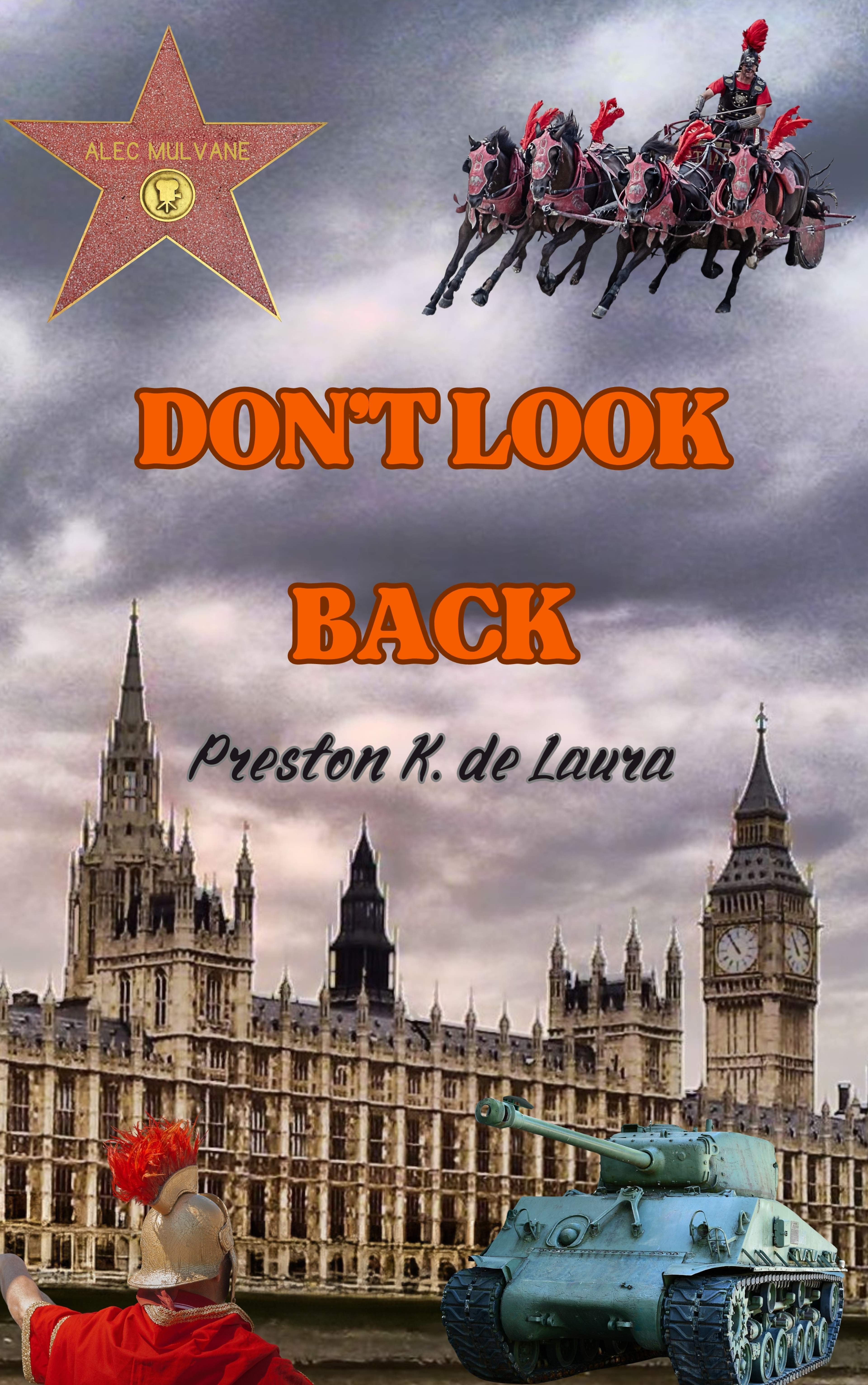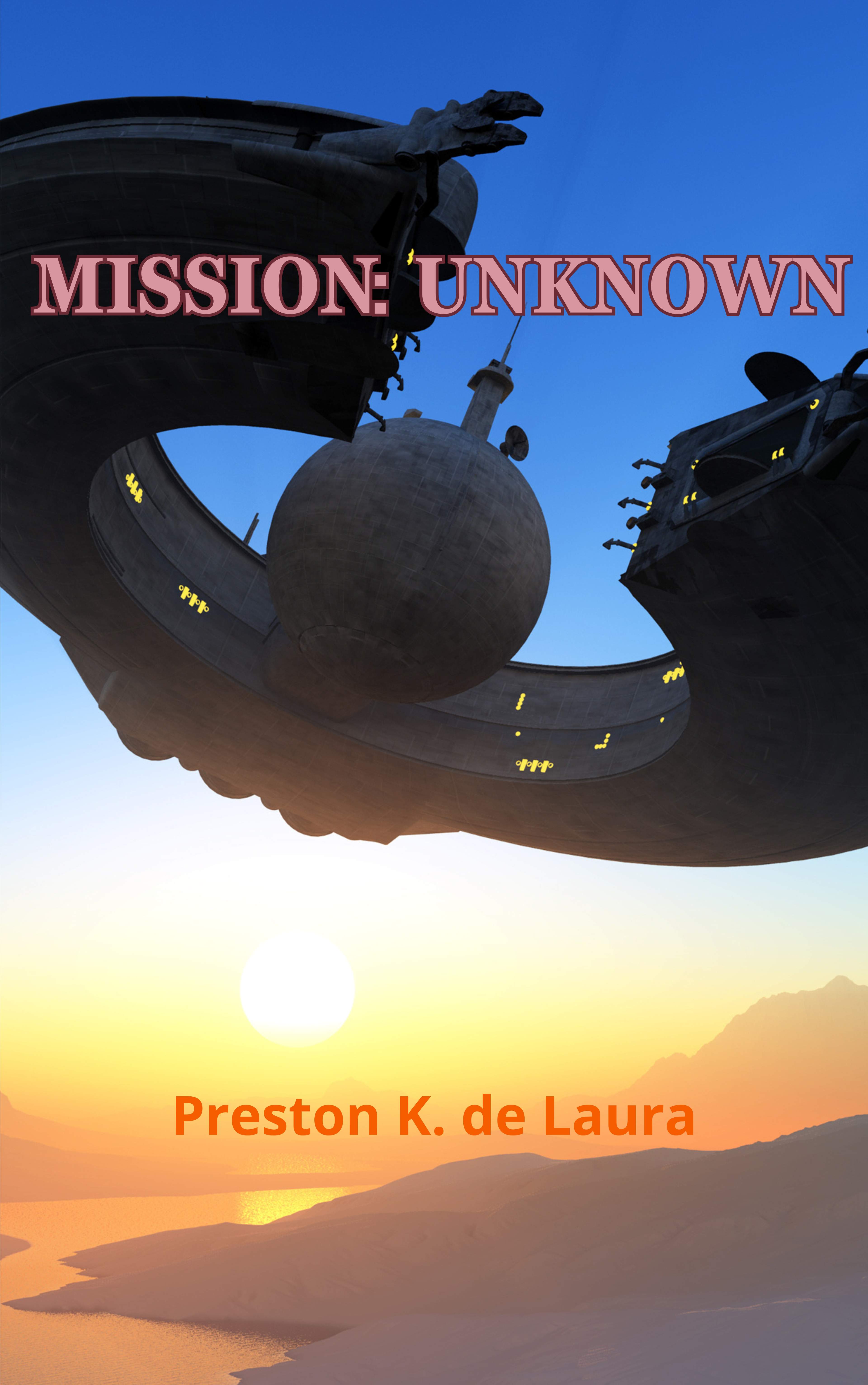A short list of my projects:
Don't Look Back: A Time Travel Science Fiction
Don't Look Back:
A Time Travel Science Fiction (Three-chapter excerpt)
Preston K. de Laura
"The best way to predict the future is to create it."
Peter Drucker
–1–
November, 2014, UK
St. Albans, a small town located 22 miles north of the British capital, is situated in the county of Hertfordshire and is part of the vast London metropolitan area.
At ten past eleven in the morning in St. Albans, a disheveled man popped up in front of the Victorian house at 7 West View Road, and started pounding on the door frantically. Having received no reply, he reached for the doorknob, entered the house, and headed to the second-floor bedroom, skipping two or three steps at a time.
The disheveled one shook the shoulder of the man in the bed.
"Jared! Wake up!"
Jared drowsily half-opened his eyes, cast an indifferent glance at the intruder, and drooped his eyelids.
"Hey!" The hand continued shaking the defenseless shoulder. "I sent it back! You understand? I’ve sent it!"
"Who did you send?" Jared asked in a martyr’s tone. "What time is it?"
He reached for the cell phone on the nightstand. Failing to focus on the clock displayed on the screen, he yawned, turned to his other side, and prepared to go back to sleep. He vaguely noted to himself that it wouldn't be a bad idea to lock the door the next time he came back home in the dead of night.
"Don’t even think about making yourself comfortable," a warning came from the tousle-haired man. His fingers closed in an even more merciless grip on Jared’s shoulder.
Inarticulate protests followed, in the form of moans and groans.
"Don’t you grasp what I’m saying? The machine works! Can you imagine what a leap for science this is?"
"I don’t give a toss about your science! Let me sleep!"
The disheveled one stretched to throw the blanket open.
Jared sat up in bed with a sigh. The room spun before his eyes. His breath stank, his head was echoing and his stomach was sending persistent signals that it wanted to get rid of its content. All signs of a nasty hangover.
"Well ... Odell, you’ve already trespassed on my property. You obviously have no intention to bugger off before announcing what you have in mind to announce. On the other hand, I don’t have the energy to grab you by the collar and throw you out. So, get to the point!"
"I’ve sent the mug," the disheveled one informed him cheerfully. "My tea mug. The porcelain one."
"What do you mean you've sent it? Where? To the shop?"
"Back in time."
Jared blinked stupidly. He wondered whether he could be able to make another attempt to sink back into the warm bed. He bitterly concluded that the trick wouldn't work and gave up. Instead, he decided to take a shower when he had enough strength to make it to the bathroom.
"Well?"
"Well ... what?"
"Won’t you show me the mug?"
"Can't do that," replied Odell. "I don't have it. It's in the museum."
Jared's bloodshot eyes glared at his childhood friend.
"Okay," Odell began to explain patiently. "Let me start over. I've built a time machine."
"Aha!" Jared rubbed the numb spot on his shoulder. "Congratulations then!"
"I know how it sounds, but it's true. The machine is at my place."
Jared shut his eyes. Odell immediately poked him in the ribs.
"To test it, I sent my pocketknife five months into the past. I assumed the material would simply age. Then a laboratory analysis would be necessary to prove the result because five months isn’t exactly an eternity, right? But let me tell you, I was in for a shock! The moment I activated the machine, the knife vanished into thin air. Poof! Gone without a trace."
Odell interrupted his own tirade. Eyebrows raised, he began to monitor whether his friend's suspicious blinks would develop into a catnap. Yet Jared heroically kept his eyes open.
"After meticulously searching the room," resumed Odell after a while," I started doubting my calculations. Did I mess up an equation or something? I painstakingly reviewed my notes and even disassembled the machine. But guess what? Everything was in perfect order! Not a single glitch. Then, just last Wednesday, I went for a walk in the back garden. There it was — a reddish object in the grass. I bent down and found ..."
Odell rummaged out a Swiss Army knife from his back pocket and triumphantly raised it.
"What's that?" Jared reached out sluggishly. "Seems too well-preserved, I reckon. Not a bit of rust on it! Considering the moisture out there, five months should –"
"The steel is stainless," Odell said in a flat voice, taking his knife back, a sour expression on his face. "Are you going to listen, or are you going to nag at me?"
"Do I have a choice?"
"I was brimming with excitement," Odell ignored the remark and continued with enthusiasm. "I had to convince myself that all was running smoothly. I decided to give the experiment another shot, this time with the tea mug. You remember which one, don’t you? Well, I sent it to the 18th century, or thereabouts. There might be some deviation, but let’s not get caught up in the details. I scoured my place, then the neighborhood. To cover my tracks, I was forced to lie I went into the antiques business. Don't ask me how the old folks who gather at Mrs. Borowski's stared at me! Anyway, the bottom line is I found no trace of it. So, I expanded my search area. You won’t believe what happened next. Yesterday, I stumbled upon the mug in the Watford Museum."
"In Watford?" Jared finally began to apprehend the significance of the conversation. "How did it get there?"
"A peasant found it. The mug must have been owned by his family until the mid-nineteenth century when they sold it or gave it to the local vicar. The vicar's granddaughter donated it to the Urban History Museum of Watford."
"How can you be sure it's your mug?"
"Of course, I'm sure! Come on, get up!" ordered Odell.
"Why?"
"We're going to Watford. You'll see it with your own eyes."
Jared studied his friend's disheveled hair critically.
"Not before I take a shower," he said.
–2–
Jared Segovia pulled up a stool and plopped down on it. He was in Odell's house at Orient Close. There were four other people in the living room beside him and the host. They had all surrounded the machine, looking at it with respect.
"I can't believe it actually works!" Alec exclaimed.
"We have to believe," Valerie said. "We saw the mug."
Everyone present had visited the museum in Watford at least once during the past three days. The inexpensive mug, which could be purchased from any corner shop nowadays, was on display alongside artifacts from the reign of George III. A brass plate in front of it briefly described the story of its discovery and its fate to the present day. An absurd inscription for the Age of Enlightenment — "World's greatest boss" — was printed on the glossy surface of the mug.
The curator of the museum did not fail to point it out to them. Many believed, in his words, that such inscriptions were the brainchild of the kitsch that had flooded the world with mass-produced Asian goods in the twentieth century. But they were dead wrong! Here was proof that the British, with their famous sense of humor, had been the first to think of putting jokey writings on kitchenware! The curator was very proud of this exhibit because, to his knowledge, it was one of a kind.
The mysterious appearance of the mug in the museum was the reason for the presence of the six of them in the living room. The porcelain object with the worn inscription had tremendous historical value, but not because of what the curator assumed.
The mug had traveled through time.
Odell was a man who could hardly keep a secret. He told Jared about his discovery, and after doing so, he rushed to his girlfriend Sonia Berkowitz to shamelessly brag. Jared, in turn, shared the secret with his fiancée Valerie and his longtime American friend Alec. Alec confided it to Fabrice, a former classmate of his, an eccentric and free-spirited individual of French origin. Thus, a small group of initiates was formed.
"Just imagine the possibilities," Odell was ardently speaking. "We place a laptop in the center, where the focus of the field is. Here we set the year, and … we turn history upside down! The ancients weren’t stupid. If we help them a little more by adding a battery to solve the power supply problem, they would sooner or later figure out what the computer is meant for. Then they would be given access to knowledge ages ahead of their time. What will come out of this — progress or destruction? How do you think? And I’m not talking about knowledge alone. The computer is also a source of pleasure. Imagine Alexander the Great hooked on Half-Life, instead of waging wars!"
"Yeah, right! But if he gets hooked on mustard gas or hand grenades?" Alec asked. "What would happen then?"
Odell pretended he heard nothing.
"We have to make a test with a live creature," Valerie said, without rhyme or reason. "Let’s try to send an animal to the past! Like what they did with monkeys and dogs before the first astronaut flights."
Fabrice said it sounded reasonable to him. Odell supported Valerie too.
"Reasonable, my foot," Sonia disagreed. "The machine is still being tested, isn’t it? It might not work at all the next time, while we are just chatting about tinkering with a living organism!"
"Oh, bloody hell!" Odell said abruptly. "It works! Don’t worry about it!"
Sonia folded her arms across her chest, ready to scorch the inventor to ashes with another batch of biting remarks.
The doorbell interrupted the dispute.
Odell rose with an uncomfortable feeling; a clicking sound was heard when he opened the front door. Muffled voices drifted in from the hallway as he exchanged a few words with the man on the threshold. Odell slipped into the room in an instant, his face all flushed.
"What's going on?" Valerie asked.
The inventor looked confused.
"My neighbor … Mr. Page. We have tea and play chess together every once in a while. He says he knows everything and wants to be counted in."
The momentary stun was swept away by Jared's curses.
"Well done!" he hissed. "I bet even the dead in the city cemetery know about the machine by now! We’re really good at keeping secrets!"
He remembered then that he himself had made a significant contribution to revealing the confidential information and altered his tone:
"Fine! There's no point speculating on how he figured it out. What's done is done! Let's focus on what we are going to do now. This guy, Page, what is he like?"
His friend responded nervously, "Well, he seems a nice chap. A former military. No family. We've done each other small favors. You can rely on him, if that’s your question."
"But is he going to spill the beans if we reject him?"
"How am I supposed to know?" the inventor snapped in response. "I've told you he's my neighbor. He didn't pledge loyalty to me!"
Jared turned to the others, "What’s your take?"
They had to decide quickly. The consensus was that having the man on their side was better than having him as an adversary. Plus, he could be useful.
Odell intended to add something but changed his mind and left. On his way back, he brought in a heavily built, ruddy man.
"Good afternoon," the newcomer greeted cheerily. "I'm sorry to intrude, but this is not to be missed. I know what you plan to do. And, my goodness, I give the thumbs up! To tell you the truth, since I retired, I don’t feel like staying home. So here I am with you! I really hope you're going to cut me in on your venture."
He ran his fingers through his army mustache and continued, "Oh, beg your pardon! How rude of me. Conrad Page, retired major. 145th Infantry Brigade."
"Splendid," someone muttered.
Alec approached and held out his hand. "Nice to meet you, major. I’m Alec. You’re not going to put us through military drills, are you?"
Conrad Page smiled politely.
"Listen, major," Alec started hesitantly. "You are aware that our conversation is strictly confidential and must remain between us."
"Of course!"
"May I also add that the project is still in an experimental phase."
"I presume."
"The journey we’re considering could be dangerous."
"I'm used to danger!"
"There’s a substantial risk involved."
"I'm willing to take the chance!"
"It's not clear if the machine can bring people back."
"Really? What machine?"
"Experiments with living creatures are yet to be conducted, and the result ... Uh-uh. What do you mean: 'What machine?'"
"Well," the major answered merrily, "I don’t know what machine you're talking about."
The American grew pale.
"What do you know, exactly?" he asked.
Conrad Page leaned in closer, a conspiratorial glint in his eye. "Deduction, my lad! Simple logic. I could smell something fishy when my neighbor, Mr. Hinckley, began sniffing around. He inquired about antiques, putting on a facade of interest limited to chinaware, but Mrs. Borowski observed his shrewd gaze, astutely evaluating each item like a seasoned connoisseur. Then you showed up — an enterprising young American, likely in the business world. You brought along your helpers. Ergo — you have found a marketing niche. What kind, you ask? It’s as clear as day — you’re trying to buy antiques from unsuspecting Brits for next to nothing and sell them across the ocean to the Yanks. Maybe even wholesale. You act disinterested, asking all sorts of questions just to help people get rid of their odds and ends, aiding them in cleaning their attics. How cunning!" The major raised his index finger. "But you can’t fool an old warhorse like me, no sir! Am I right? By the way, what’s that contraption in the middle of the room? Didn’t you mention it? I suppose that’s what you use to test the antiques, eh? Is it your radio-hydrogen analysis gizmo?"
Alec snorted something unintelligible and sank into a nearby chair.
Odell had an overwhelming urge to slap himself awake, while Sonia could only flash a nervous grin.
–3–
The November sun over England, when visible at all, failed to warm the soaked land. But the temperature inside Odell’s house was unusually high, not solely due to the turned-up heating. The inventor had convinced the other five members of the group to move in with him and keep their eyes open for any unusual occurrences. The move itself took place within a day. Valerie called her manager to inform him that she wouldn't make it into the office because of illness, while Jared and Sonia took a leave of absence. Odell had quit his poorly paid part-time job as a Physics lecturer.
The day of the move-in was marked by a significant event. In the evening, before the host and his guests went to bed, a chilling scream resounded through the house. The men and Valerie rushed to Sonia's room and found her perched atop the nightstand. Sonia had curled up in a ball, hugging her knees, trembling with terror. She explained, sobbing, that she had just seen a white mouse crawling out from under the duvet.
Instead of showing concern, Odell covered her with kisses.
"That’s awesome!" He squeezed her in his arms. "The best news I've heard in a while!"
Sonia pushed him away. She looked at him dazed and swung her hand. The ringing slap cooled the inventor's enthusiasm noticeably.
Odell mumbled an explanation that he had planned to buy laboratory mice tomorrow to send them one day back with the machine. If Sonia had seen a mouse, it meant the experiment must have been successful.
The others stared at him in silence, gathered by the door.
"Don’t you see what I mean? The machine can transport living creatures back in time!"
"Do you mean to say you have succeeded?" Fabrice asked, his voice filled with doubt.
"At last! Yes, that's what I'm trying to say!"
The realization that the machine might be fully operational caused confusion. Cautious comments and a flurry of questions followed. Was it really a laboratory mouse and not a house mouse? How did it get upstairs? Had anyone else besides Sonia seen it? And more along those lines.
"Let's look for them," offered Odell, disappointed by the lukewarm reaction to the news. "They should be somewhere around."
No one reacted.
"The mice, folks!" the agitated inventor clarified. "I intended to buy two. C'mon, don't hang around! Let's find out where they crept in."
They combed through the house, seeking the mice, but came up empty-handed. A more thorough search could not be carried out until daylight, so they went to sleep, exhausted.
Early the next morning, the doorbell rang. Conrad Page stood on the threshold.
He greeted Odell with a nod, passed him by, and, despite the host's protests, headed for the living room.
"I want to participate," he said.
"Jesus! Mr. Page, haven't we discussed it already? There's been a mistake …" Jared tried to send him away.
"There is no mistake, son," said the major, with no sign of his frivolous behavior from their first meeting. "I want to take part in your expedition through time. Or whatever you call it. Nothing is holding me back here anymore."
Jared instantly forgot what he was about to object.
"Damn! You know how to surprise people! How did you guess?"
"You gave me most of the hints."
There was not much to discuss. Major Page joined the group that same morning. A manned time travel was going to take place, and they had already tacitly decided on it. The only thing they were waiting for was for Odell to go over his calculations one last time. However, Fabrice dashed all hopes.
"I've found the mice," he said.
"Why do you seem so down then?" Alec asked. "Things are running like clockwork! We'll be able soon –"
"I carried one to the park at dawn. I set it free there," Fabrice interrupted him. "The other one is dead."
The news was a bombshell, so shocking that everyone stopped their daily routines and gathered in the living room.
A back issue of The Times was placed in Odell's wicker newspaper holder. Fabrice took it, moved inside the house, and when he returned, he carefully put it on the table with something wrapped inside.
The mouse was lying on the sports page.
For a while, they silently watched the dead body.
"How do you know it's not the one Sonia saw? It might be the same. It could've died after that ..."
"It can't be the same," Fabrice replied. "This mouse has been dead for more than twenty hours."
"Maybe it was ill," someone suggested feebly.
"Indeed? Do you seriously believe it accidentally kicked the bucket just when Odell had sent it on a tour through time? Why are we deluding ourselves?" Jared raised his voice. "We all know the truth. This mouse did not survive the transition!"
"But the other one’s alive!" Sonia argued. "How could one survive while the other couldn't?"
"Suppose you are right, and it really was ill. This one could have had a weak heart or mouse osteoporosis! So what? No matter the reason! The fact is, it is dead!"
They buried the mouse in the backyard. Odell asked Conrad to buy two laboratory mice so they could send them back with the machine. He muttered that a paradox might occur if they didn't, and no one needed complications right now. Then he locked himself in his room, ordered not to be disturbed, and took up studying his technical drawings and diagrams. By evening, he had already realized what was wrong.
"The power is not enough for a safe 'transition', as Jared called it," he said. "The problem is not in the amount of energy that goes into the machine, but in its transformation. The bad news is, I can't handle it alone. We need an expert in weak interactions of elementary particles. He or she should possess thorough knowledge of everything concerning the symmetry of the vacuum, vivid imagination, and an itch to experiment."
This is how Tyler came into the picture. It took a long time for Odell to consider him as a candidate. He reluctantly agreed to initiate him into the secret. Not because Tyler Jorgenson lacked erudition — on the contrary, he was a superb scientist and investigator. Yet, Tyler had a terrible temper. He had been expelled from the European Organization for Nuclear Research for breaking the nose of a fellow physicist. The scandal would have been covered up due to Tyler's brilliant work if he had apologized to his colleague. But Tyler not only refused to apologize, he also smashed the eyebrow of the physicist. Rumors claimed that he had also laid a hand on his wife when he had a drink or two more than usual.
One morning at breakfast, the inventor said, "I think we are ready now. We’ll repeat the experiment with the mice the day after tomorrow. So, look around! These stinkers are able to hide anywhere! There is something else I want to discuss with you. I believe we need to consider which one of us will go first. The most reasonable thing to do is to pick only one person to travel," continued Odell. "Let’s decide who."
Volunteers were not lacking.
"No need to rush! Besides, there is one small problem," Odell said as he spread butter over a piece of toast. He took a big bite and continued to speak calmly with a full mouth, "The person must be a volunteer because I don’t know how to bring him back."
He kept eating with appetite. Only after some time did he realize that the others had stopped having their breakfast, and were watching him unfriendly to say the least.
"We are very grateful you have deigned to inform us!" Jared's voice was sharp and edgy. "That’s nothing less than suicide! Why didn’t you tell us that before?"
"You didn’t ask," faltered Odell and hastened to add, "Still ... I still don’t know … that’s what I meant to say. It was just a poor choice of words. There is no reason the machine can’t function in both directions."
"Which means," said Tyler, "that at this stage, we cannot travel into the future. Having in mind the same reason, if we travel to the past, we won’t be able to get back to the present because, from that perspective, it would appear as our future."
"Exactly! I would like to lay special emphasis on the unfeasibility of resolving the problem for now. The future remains a closed door. But not for long, I hope."
"Is there anything else that you forgot to share with us?" Alec called out from his seat.
Odell set down the knife, the blade resting on the edge of the plate.
"Well," he delayed his answer. "There is a possibility of some deviation."
They waited for him to explain.
"It means that instead of arriving on May 15th, 1910, for example, you may find yourself on April 7th or June 22nd."
Jared sighed patiently.
"But everything else is under control!" Odell said cheerfully, before returning to his breakfast.



